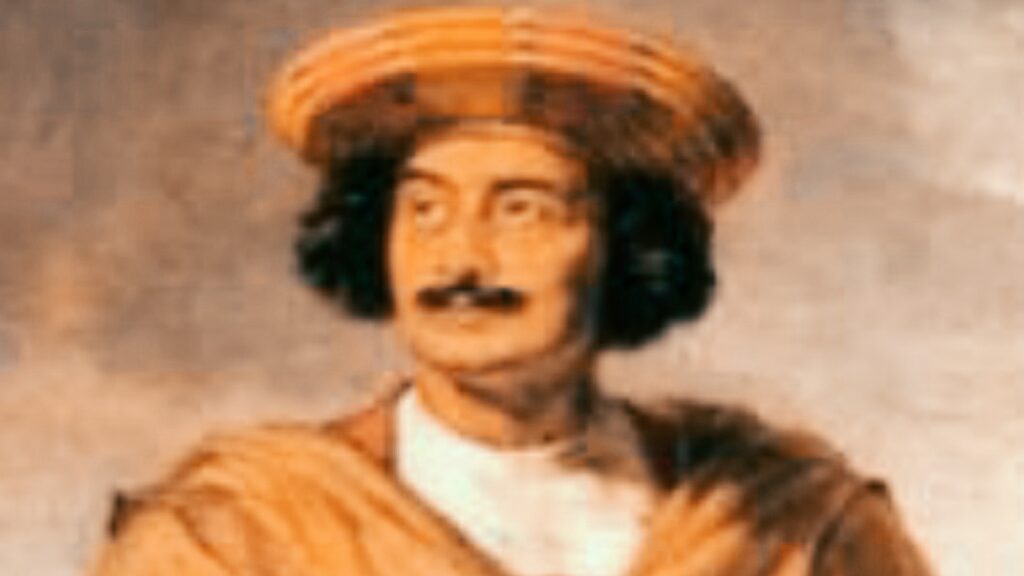Raja Ram Mohan Roy is one of the Indian greatest thinkers and philosophers. He greatly influenced by the teaching of Jesus and it was because of the influence of Christianity that he believe in monotheistic.
He was also a social reformer. Raja Ram Mohan Roy rejected all the social evils and fight for the better and unity in society. Thus, this paper will emphasize the theology of Raja Ram Mohan Roy’s thought on person and work of Christ.
Raja Ram Mohan Roy

Raja Ram Mohan Roy is hailed as the ‘morning star of Indian renaissance’, ‘the father of modern India’, and has also been called ‘Father of Indian Renaissance. He was born in 1772 in a Brahman family of Bengal.
Raja Ram Mohan Roy was the first Indian leader to take the Christian faith seriously and also has responded to it extensively. He mastered several languages like Bengali, Sanskrit, English as well as Persian, and Arabic.
From 1815-1830, he lived in Calcutta and wrote in Bengali, Sanskrit, and English. He also well known in missionary circles, politics, and the field of education.
Raja Ram Mohan Roy was a humanist and rejected Sati, infanticide, and the caste system. He also influenced by Quran, Parsee religion, Upanishadic Philosophy, and the Unitarian belief. He was strictly monotheistic and anti-idolatrous; and his attempt was to recreate human brotherhood and unity of all religions of humankind.
In 1815, he established the Atmiya Sabha, then Brahma Sabha and later it became Brahma Samaj. He sailed for England in 1830 on a visit that brought him great fame and popularity.
Raja Ram Mohan Roy hoped to return to India for further service of his people but died in Bristol in 1833. His name honored in India as a great patriot and pioneer of social reform.
Person of Christ
His attitude to Christ is one of reverence, as for a great teacher and a messenger of God but denies the title ‘Son of God’ attributes divinity. He also rejects the deity of Christ and accepting an Arian Christology that Jesus was no more than a created being, and not the creator.
Robin Boyd affirms that Raja Ram Mohan Roy quotes many scriptural passages to prove what he calls ‘ the natural inferiority of the Son to the Father’. And holds that Jesus merely delegates with power from God, but does not possess this power intrinsically.
The unity with the Father implied in certain Johannine texts is mere “a subsisting concord of will and design, such as existed among his Apostles, and not the identity of being”.
Even though he does not accept the title ‘Son of God’ and other scriptural titles of Christ; but always in a qualified sense, implying that each one is a special gift conferred by God rather than by his right.
Strangely, he accepts the doctrine of the virgin birth and does not deny the miracles of Christ; even the resurrection, but insisted that they are unimportant. He also points out that the Holy Spirit is not so much a person as ‘it’ is an influence, or power, of God- it is not self-existent, as it proceeds from the Father as does also from the Son.
This means that only God is to be worshipped, not the creatures, and for Him. The Son and the Holy Spirit belong to this lesser realm. To worship the Son and the Holy Spirit would be equal to primitive Hindu worship.
Work of Christ
He believes that the saving work of Christ accomplished through his teaching; and his death is simply the supreme illustration of those statements that the only object of his mission. Though he affirms the virgin birth and the miracles and even bodily resurrected; yet his emphasis is on none of these, but only on the teaching of Jesus.
He does not also see the saving significance of Christ’s life, that is, of the cross and the resurrection. He states that there is no biblical evidence for such a doctrine of the cross; as the all-sufficient means for our salvation. But repentance instead is the only means.
The plan of salvation is for him a very simple one. ‘This do and thou shalt live, said Jesus, and the following of his precepts is ‘the best and only means of obtaining the forgiveness of our sins; the favor of God, and strength to overcome our passions and to keep his commandments.
If we repent we receive forgiveness. And there is no need for an atoning death, though we greatly helped by the supreme example of the Cross.
If we fail to follow Jesus’ teaching as we certainly did, the solution lies in repentance; as Ram Mohan Roy says that it is ‘the most acceptable atonement on our part to the All-merciful; when we have fallen short of that duty’.
This is the nearest that he approaches a doctrine of repentance, faith, grace, and forgiveness. He also finds divine injustice if God inflicts suffering on an innocent person on behalf of others. It would in turn in-consistent with the justice of God.
Conclusion (Raja Ram Mohan Roy)
The above discussions affirm Raja Ram Mohan Roy as a great influence in regard to the condemnation of social evils; and inhuman practices. He worked hard to enlighten Indians. Though he held distinct about Jesus, he had the highest respect for Jesus.
His understanding of the Bible, Christ, God, and Christianity gave shape to a particular Indian theology. Though his belief in Christ is more or less similar to the Christian belief; His declining Christ as the son of God and ungiving priority to the resurrection of Christ; was the main contrasting belief to the Christian.